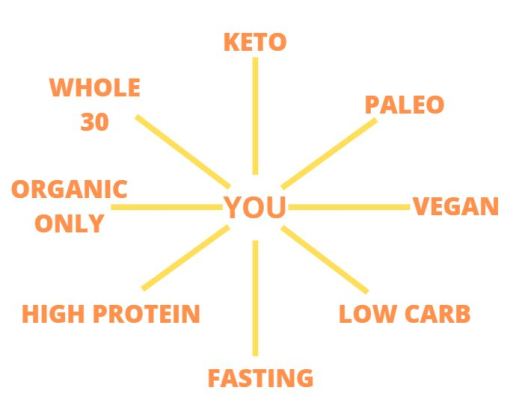We’ve all seen them. Nutrition “experts” that claim their way is the way. Some of their ideas are backed by science. There are some who rightly use experience plus science to help guide people. Sadly, though, most are trying to sell you something. Whether it’s an idea or a product, they’re pushing “something” for a reason.
That reason is, well, they’re trying to make a living. Could be they’ve written a book or just trying to build a base to get more clicks or views. I see this in sports all the time. The loudest, most obnoxious guy in the room **cough** Colin Cowherd **cough** gets the most attention. And the nutrition world is no different. An industry that isn’t exactly heavily regulated is a recipe for wild claims, hot takes, and strong opinions.
You’ll see things like:
“Everyone should eat Vegan to save animals and the planet.”
“Our bodies were originally meant to use fat as a source of energy therefore everyone should eat Keto.”
“Our ancestors ate meat, berries, and things they could get from the ground and that means we should all eat that way…”
“The 100% protein diet (aka Carnivore diet) is perfectly healthy in 2020.”
“Keto can cure cancer.”
“Intermittent fasting is the best way to lose fat.”
Think I’m crazy? Go look up some of those claims. Yes, there are some studies that show that eating a ketogenic diet can decrease cancer cell growth (because cancer cells love them some glucose) but to make the claim that if you eat Keto you can cure your cancer is ridiculous. There just isn’t enough scientific proof to make such a claim.
Also, there has never been a 100% vegan or even semi-vegetarian civilization. So to suggest that we should be eating that way is silly. Does that make veganism bad? Not at all, but it’s certainly not a universal truth.
Long term studies on the effect of eating a Ketogenic diet do not exist. We just don’t have enough data to suggest that eating Keto long term (years, decades) would have lasting health benefits. Short term? (weeks, months, maybe a year) Sure. Lots of benefits. Long Term? Not so much.
There’s this weird thing that happens when (some) people have success on a diet: They see these positive results and think it’s how everyone should eat (aka they become polarized.) These “diet zealots” create mini echo chambers and then apply these universal truths to all of humanity. But if we put all these “diets” in a circle and drew a line from one extreme to another, the middle is likely where most of us should live.

Sure, there are benefits to all of these diets (and I’ve tried them all). Some are better than others but that’s a matter of preference.
Keto is great for those who feel better eating more fat than carbs. The problem is many people don’t do Keto correctly. Eating processed cheese and butter to get your 70-80% of calories each day from fat isn’t Keto. You’ll lose weight, sure, but that’s not because you’re in ketosis. It’s ’cause you’re eating virtually no carbs (and in a calorie deficit).
Low carb (as in less than 50-100 grams a day) is great too but are you getting your daily dose of fiber/fruits/veggies or are you just eating a ton of protein? Same for High Protein (getting 80% of your calories a day from protein). Where are the veggies? Where’s the fiber? Where’s the gut health? Where’s the balance?
Vegan is great. My wife is vegan and I love the food she eats. Since she went vegan, my daily veggie intake tripled. So thumbs up to that. But it can be very restrictive and for those trying to gain muscle mass or lose weight, it can be hard to get enough protein each day without blowing out your carb intake (which can lead to weight/fat gain).
Intermittent Fasting is a great nutritional tool for several reasons. People who fast often feel more focused and less “heavy”. It’s been shown to help with portion control and the eating window allows for people to feel more satiated (since you’re getting so much to eat in each meal).
And that’s the point. These are all nutritional tools, not universal truths. Depending on your desires, one of these diets can help you meet that goal (more on that next week).
You may even need to mix and match. Integrate some days where you intermittent fast. For several weeks (12+) eat a balanced diet of 50% of your calories from protein, 25% from fat, and 25% from carbs. If that didn’t work for you (though you lost some weight), adjust the “macros” till you find that balance where you are eating in a way that promotes adherence but keeps the scale going down (or up).
Whatever you do, just avoid falling into one of these “tribes”. Stay balanced. Eat healthy.

